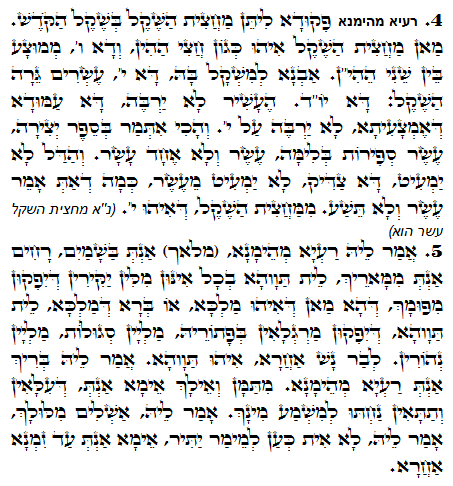Daily Zohar # 1433 – Ki Tisa –

Hebrew translation:
5. אָמַר לוֹ רוֹעֶה הַנֶּאֱמָן, (מַלְאָךְ) אַתָּה בַּשָּׁמַיִם, אָהוּב אַתָּה מֵרִבּוֹנְךָ, אֵין תְּמִיהָה בְּכָל אוֹתָם דְּבָרִים נִכְבָּדִים שֶׁיָּצְאוּ מִפִּיךָ, שֶׁהֲרֵי מִי שֶׁהוּא מֶלֶךְ אוֹ בֶּן הַמֶּלֶךְ, אֵין תְּמִיהָה שֶׁיַּעֲלוּ מַרְגָּלִיּוֹת בְּשֻׁלְחָנוֹ, מְלֵאוֹת סְגֻלּוֹת, מְלֵאוֹת אוֹרוֹת. לְאָדָם אַחֵר זוֹהִי תְּמִיהָה. אָמַר לוֹ, בָּרוּךְ אַתָּה הָרוֹעֶה הַנֶּאֱמָן, מִשָּׁם וְאֵילָךְ אֱמֹר אַתָּה, שֶׁהֲרֵי עֶלְיוֹנִים וְתַחְתּוֹנִים יָרְדוּ לִשְׁמֹעַ מִמְּךָ. אָמַר לוֹ, הַשְׁלֵם דִּבּוּרְךָ. אָמַר לוֹ, אֵין כָּעֵת לוֹמַר יוֹתֵר, אֱמֹר אַתָּה עַד פַּעַם אַחֶרֶת.
Zohar Ki Tisa
The Zohar begins to discuss the subject of ‘Half of the Shekel’ that the Israelites were required to give for the special counting. The rich and the poor gave the same exact amount because it is a direct connection and elevation of the soul. It teaches us that every Isarelite soul is equal in the eyes of God. Why it is ‘called Half a Shekel’?
Why do we follow this ‘tradition’ every holiday of Purim? What is the connection to Shabbat Zachor?
I will write a detailed explanations on this subject and more in the next Daily Zohars on Ki Tisa.
{||}

 Previous: Ki Tisa
Previous: Ki Tisa

